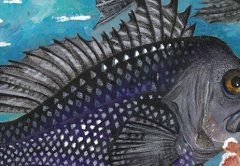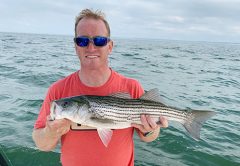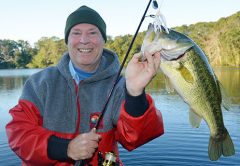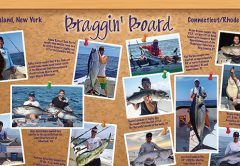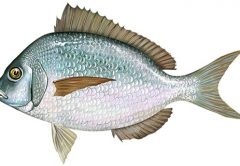By Zach Harvey
Oh, to have back the untold thousands of hours I’ve squandered in two decades trying to justify my escalating fluke habit to “real” fishermen who measure what they hunt in terms of their own testosterone production. Never mind my 15-plus-year defense of scup fishing.
Them things (i.e. fluke) fight like the tire on my kid’s bike.
And you think like the tire on your kid’s bike. Why don’t you go kill a real yellowfin with a hammer. Meathead.
What do I see in fluke? To attempt an explanation for a striper specialist would be like trying to read a sonnet to a water-logged two-by-four. No, fluke don’t grow to 50 pounds. And yes, actually, I did catch a 50-pound bass and so not having caught a big one is n-o-t the reason I hang my stripers one peg below my summer flounder.
I like playing pool, loved tennis and squash. I love many other games—playing them, not watching others play them. The sports metaphors that sneak into my everyday thinking mostly relate to the pool table. I assume that fact probably says something about me. A few of my friends have told me my obsession with fluke fishing makes sense, then invariably land on the word, “finesse,” which is the lead cliché about the fluke fishery. The word sounds like a yawn to me, so I counter with imagery on loan from the billiards hall: Fluke fishing, by which I mean catching 7- to 12-pounders on purpose, is like breaking a perfectly-racked frame of nine-ball and running the table.
Striper fishing—or bickering about high-speed trolling spreads where the continental shelf dumps off into the abyssal plain—is like playing bar-pool eight-ball with a guy who doesn’t call his shots—who sinks a shit-luck two-bank shot then assumes an expression that reads: I meant to do that.
I love fluking because I can put in a six-hour effort and not know deep down that I half-assed it. I love tuna fishing, too, but it makes me hurt, and closing in on age 40 I’m increasingly adamant about the age-old sport fishing refrain: This is supposed to be fun.
Staying up to sling chum and work the lines, or clearing little bits of Sargasso weed off spreader bars, bleary-eyed in the sickening dawn, stomach churning with a fourth pot of coffee and 43 cigarettes, I approach the point where I’m having serious doubts about whether I really want to square off with what we’re trying so hard to catch. Is it fun? Or is it whacking myself in the forehead with a brick because it’s going to feel so good when I stop?
Fun in my present tense is relaxing, but more now than ever before in my life, relaxation demands total immersion in the day’s diversion. I love immersion in all kinds of activities, whether sitting still or straining to catch my breath. Targeting monster striped bass offers immersion—up to my knees in green water when the scuppers get indigestion, or immersion in the full-time labor of staying upright as we bounce and slam around in a rip face, battling its intermittent compound gravity. I love and respect your stripers, and I’ve caught loads of them—schoolies and slobs—in all kinds of different places with all different kinds of gear. What I mean is: I get it.
Here’s the trouble: My first loyalty in my free hours is to fun, and frankly, people spend too much time looking stoic and vigilant and square-jawed, looking brave and strong when there are stripers around. There’s too much earnest talk about the virtues of “fishing hard”—two words that sound, under the heading of sport, like the bastard son of mini-golf and hospital-grade constipation.
Fluke are fun and I can fish at any intensity level given time constraints, tides, mood, or the skill level of my companions. Fishing the outermost rock with the slimiest bubble weed underfoot on the darkest, windiest night looking for a 30-pound cow is not a sliding-scale undertaking. It’s fun—one size fits all.
What I know—and if you’re fluke-afflicted, you know it, too—is that after a day’s search for quality fish, I sit down before a plate of fried fluke, mashed potatoes, one of the perfect late-summer tomatoes sliced and salted lightly, and a steaming ear of corn. I recount the day’s triumphs, my big fish for the day (a six-pounder, say), and those two sledgehammer bites I completely bollixed up. A couple of truly offensive jokes, told flawlessly as we ran back up between drifts. Standing in the waning afternoon sun, warming my bones just before the faint evening chill sends me to the car. The immense hug from the smallest person in my household, Kaya, age five now, who remains, miraculously—and not for too much longer—oblivious to the day’s powerful stench on Dad.
Truth be told, I’m for any fishery anyone does for genuine love of the quarry, the meticulous rituals of preparation, the fine-tuning of approach over years, the ball-busting and sharing of sandwiches during slack tide. The politics—critical as it is to make yourself management-literate, lest there be no one to advocate for the future of our life passion—is a black hole for rod-and-reel fun. That’s nasty business for long winters. So let’s all—I’ll include myself, here—stand by with the hellfire-and-brimstone sermonizing pending the six waves of shaky rec catch data. When the “paybacks” come down the ASMFC pike, there will be all kinds of time for snarling and colorful expletives.
Last thought: Surveying the last ten years of catch-limit wrangling, one thing we all need to spend more hours doing? Stop bickering about “these kids today” long enough to go find one of them and pique his interest in our chosen form of merriment. “Take a Kid Fishing”—once—is feel-good for a self-congratulatory banquet in February. We need to start thinking in terms of “Teach a Kid Fishing,” keeping it front of mind, as we do so, that the fishery’s ten-year prognosis ultimately rides on our success at making it fun for the next generations.




